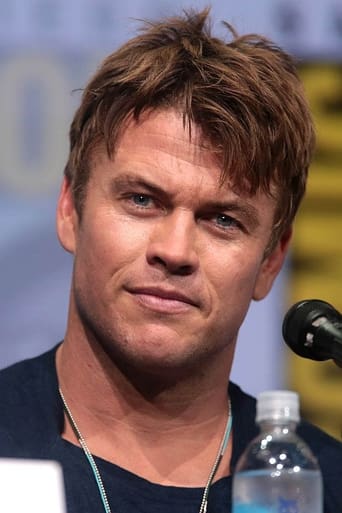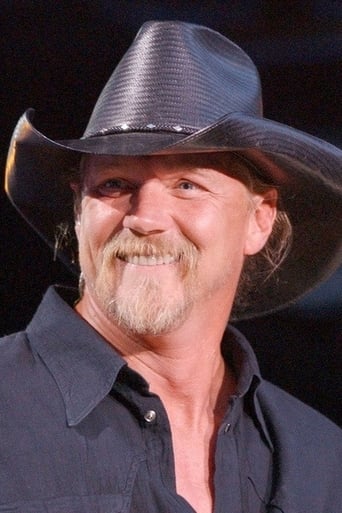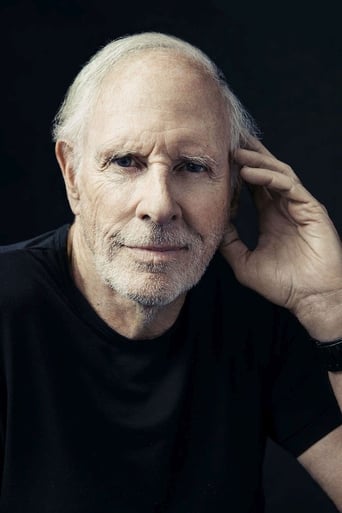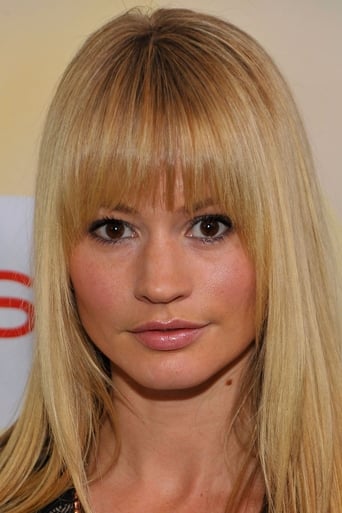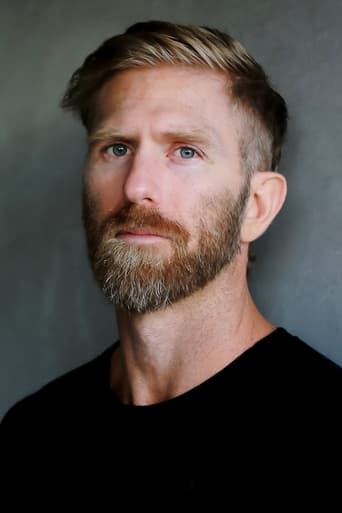Neil Welch
Bill Hickok, appointed chief lawman in Abilene, finds himself at odds with a local business bigwig.This film, starring Luke Hemsworth as Hickok, purports to be a biopic of his early days and his transition from itinerant vagrant to lawman. I have no idea how true it is, other than that it is truly dull. Even the action is unexciting.There is an ill-judged love story featuring a young lady so dour you can't imagine one person in competition for, let alone two. And Hemsworth is considerably less possessed of charisma than his two siblings.On the other hand, there is no bad kanguage, and the film is in focus. I can find no other grounds on which to recommend it.
buckm-27789
Students of history know the legend of James Butler Hickok was highly fictionalized in the dime novels of his era; however, this film goes so far beyond fiction that the title and titled character could have been called Wild Bill Pisspot and no one would be any wiser that the story was supposed to be about Hickok. The acting barely existent. Kris Kristofferson has kept his streak alive by being in yet another film in which displays absolutely no acting ability. As for Trace Atkins, he definitely shouldn't quit his singing career since it's something he's actually good at. I'm sure he's having fun dressing up and playing cowboy in the movies, but he does so at the cost of his dignity. He should consider firing his Hollywood agent and any posse of yes men who deceptively praise his performance, and face that fact acting talent he has not. Luke Hemsworth's performance is mediocre at best, but I believe it's entirely a result of an idiotic, unscreenworthy screenplay and lack of directing talent. I liked Bruce Dern as the kindly old drunken doctor, but the Director and Screenwriter did him a grave disservice by limiting his role and providing him dialogue that is far beneath his talent. I'll never forget the first time I saw Bruce Dern in a movie. It was 1972, I was 11 years old watching John Wayne and The Cowboys at the local movie house, and Bruce Dern simply scared the the hell out of me and my buddies when he threatened the little cowboy with the eyeglasses. For a long time afterward, we all but despised Dern. To making such a lasting and emotional impression on a generation of movie goers is the sign of an exceptional actor. As for the editing of this not so fine feature, once could only assume the job was given to the producer's young brother-in-law in order to just get his unreal Hollywood housewife to get the hell off his back about finding Junior a job in the movie business, because this film's editing is as choppy as it gets. To all the non-psychic investors out there who actually helped finance this F-class movie, I'm sure there are many more realist viewers out there who are thinking...."suckers!"
Ray3100
The movie starts with the Confederate army using a gatling gun and goes downhill from there. A few union commanders used their own money to purchase 12 of these guns. The US Army didn't officially buy any until 1866. The Confederates never had any. Then there's the problem with John Wesley Hardin. First of all, his alias was Wesley Clemmons, but the movie implies it was the other way around. And second, Hardin was never Hickok's deputy. Finally, the climatic battle between the villain and the hero. It happened on the street not in the saloon and only Poe was killed, except for a real deputy that Hickok shot on accident. I usually try to give Hollywood some leeway when it comes to historical accuracy, but this is just too much.
zardoz-13
Anybody who knows anything about Old West heroes knows that the legendary 'Will Bill' Hickok bit the dust in Deadwood, South Dakota, in 1876, when a disgruntled poker player by the name of Jack McCall cold-bloodedly came up behind him and blew the back of his head off. Described as an appallingly bad gambler, McCall had grown despondent with his losing streak, and he surprised Wild Bill when the latter least expected it. When he died, Hickok held black aces and eights, known now as "The Dead Man's Hand." Later, McCall went to trial, was convicted of murder, and swung on the gallows. "Traded" director Timothy Woodward, Jr's predictable, but entertaining biographical rehash of the famous lawman's life in "Hickok," adds little of consequence what is generally known about the protagonist's notorious reputation. More specifically, Woodward confines himself to Hickok's daring exploits during the American Civil War and his early years as a lawman in Abilene, Kansas, and his troubles with glaucoma, before his tragic demise in Deadwood. Of course, Woodward and "Perfect Target" scenarist Michael Lanahan alter history so it least interferes with their bullet-riddled, horse opera. Although he wore his hair shoulder-length, with a mustache, the eponymous hero is clean-shaven and closely trimmed. In his first starring role, Australian native Luke Hemsworth holds his own as 'Wild Bill' against veteran actors like Trace Adkins, Kris Kristofferson, and Bruce Dern. Hemsworth wears black well and looks sufficiently imposing. Hawaiian native Kaiwi Lyman-Mersereau deserves honorable mention for his performance of another real-life ruffian, the infamous John Wesley Hardin. Meanwhile, Adkins is appropriately cast as the primary villain, and his deep, grouchy voice accentuates his villainy. Kristofferson and Dern exist on the fringe, with Kristofferson earning more screen time with a backstory that restores his youth. What distinguishes "Hickok" from many low-budget westerns is the attention to detail that Woodward has paid to the settings. The Dozens of extras wander the streets of Abilene so that it looks like the town is inhabited. settings look convincing, and the superior production values lend "Hickok" greater authenticity. Spanish lenser Pablo Diez's widescreen cinematography captures the moment every time with either wide-open long shots or atmospheric close-ups."Hickok" unfolds during the American Civil War with a brief skirmish between Union and Confederate soldiers. Under heavy fire from Southern cannon and a multi-barreled Gatling Gun, an audacious Hickok (Luke Hemsworth of HBO's "Westworld") vaults astride a horse and charges the enemy, brandishing two cap and ball revolvers like Clint Eastwood in the classic "Outlaw Josey Wales." You'd think that the guys on the rapid-firing Gatling Gun could have turned Hickok into a sieve. Instead, they are such inept marksmen that he comes out without a scratch. Of course, they couldn't kill our hero because that would stop the action dead in its tracks. After this brief but bloody opening gambit, "Hickok" picks up the life of the celebrated gunslinger seven years later. 'Wild Bill' is accurately portrayed in one instance as a vagrant who cannot afford a train ticket. Nevertheless, Hickok's intervention in a poker game later where one player accuses the other of cheating brings him to the attention of Abilene Mayor George Knox (Kris Kristofferson of "Heaven's Gate"), and he hires him as town marshal for $150 a month and board. Hickok tries to cut a bargain with villainous saloon-owner Phil Poe (Trace Atkins of "The Lincoln Lawyer") for quarter share of their profits, and they have a tetchy relationship, especially after Hickok bans all firearms from being worn in Abilene. Worse, Poe learns that his betrothed, Mattie (Cameron Richardson of "Rise: Blood Hunter"), was once married to Hickok. Poe smashes up Mattie's face, and his villainy gets out of hand. At this point, Poe wants 'Wild Bill' dead, and he is prepared to pay anybody whatever it takes to put Hickok in a hole six-feet deep. Initially, the first contender is none other than John Wesley Hardin (Kaiwi Lyman-Mersereau of "American Crime"), but the two gunslingers have too much admiration and respect for each other. Hickok convinces Hardin to pin on the badge of a deputy marshal to keep him on the right side of the law. These two have an interesting scene in Poe's bar when they compete against each other with target practice on a bottle. Hickok shoots the cork out of it, but Hardin goes one better and shoots the cork out of the bottle while its spins! For the record, as many as eighteen notable actors have portrayed the flamboyant, fast-draw, sharp-shooter on the big screen as well as the small screen. Luke Hemsworth joins the likes of such greats as William S. Hart, Gary Cooper, Roy Rogers, Forrest Tucker, Guy Madison, Charles Bronson, Jeff Bridges, and Josh Brolin who have all portrayed this colorful personality. Unfortunately, "Hickok" isn't as exciting as earlier movies, among them "The Plainsman" (1936), "Will Bill Hickok Rides" (1942), the 1966 remake of "The Plainsman," "Little Big Man" (1970), "The White Buffalo" (1977), and "Wild Bill" (1995). Woodward stages the shoot-outs without the acrobatic flair that characterized Spaghetti westerns in the 1960s and the 1970s. Most of the violence is impromptu, and the participants don't stick around long after they have emptied their revolvers. The low-budget becomes somewhat obvious because most of the action takes place in Abilene instead of out on the plains. The grand finale in Poe's saloon near fade-out with Hickok and Harden knocking down Poe's paid pistoleros is the exception to the rule. During the moments leading up to it, Hickok and Poe are staring each other down, until Poe shouts that he will shell out $500 to the first man to kill 'Wild Bill.' Woodward doesn't wear out his welcome with this slowly-paced, 88-minute oater that boasts an adequate amount of gunplay. Altogether, "Hickok" qualifies as a fair account of 'Wild Bill' shenanigans in the context of a formulaic 'town taming' western.


